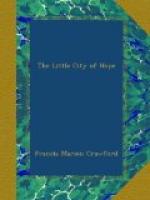One thousand more, clear of living expenses, would do it. He was positively sure that it would be enough, and he and the boy could live on his little cash balance, by great economy, for four months, at the end of which time the Air-Motor would be perfected. But without the thousand the end of the four months would be the end of everything that was worth while in life. After that he would have to go back to teaching in order to live, and the invention would be lost, for the work needed all his time and thought.
He was a mathematician, and a very good one, besides being otherwise a man of cultivated mind and wide reading. Unfortunately for himself, or the contrary, if the invention ever succeeded, he had given himself up to higher mathematics when a young man, instead of turning his talent to account in an architect’s office, a shipbuilding yard, or a locomotive shop. He could find the strain at any part of an iron frame building by the differential and integral calculus to the millionth of an ounce, but the everyday technical routine work with volumes of ready-made tables was unfamiliar and uncongenial to him; he would rather have calculated the tables themselves. The true science of mathematics is the most imaginative and creative of all sciences, but the mere application of mathematics to figures for the construction of engines, ships, or buildings is the dullest sort of drudgery.
Rather than that, he had chosen to teach what he knew and to dream of great problems at his leisure when teaching was over for the day or for the term. He had taught in a small college, and had known the rare delight of having one or two pupils who were really interested. It had been a good position, and he had married a clever New England girl, the daughter of his predecessor, who had died suddenly. They had been very happy together for years, and one boy had been born to them, whom his father insisted on christening Newton. Then Overholt had thrown up his employment for the sake of getting freedom to perfect his invention, though much against his wife’s advice, for she was a prudent little woman, besides being clever, and she thought of the future of the two beings she loved, and of her own, while her husband dreamed of hastening the progress of science.
Overholt came to New York because he could work better there than elsewhere, and could get better tools made, and could obtain more easily the materials he wanted. For a time everything went well enough, but when the investors began to lose faith in him things went very badly.
Then Mrs. Overholt told her husband that two could live where three could not, especially when one was a boy of twelve; and as she would not break his heart by teasing him into giving up the invention as a matter of duty, she told him that she would support herself until it was perfected or until he abandoned it of his own accord. She was very well fitted to be a governess; she was thirty years old and as strong as a pony, she said, and she had friends in New England who could find her a situation. He should see her whenever it was possible, she added, but there was no other way.




